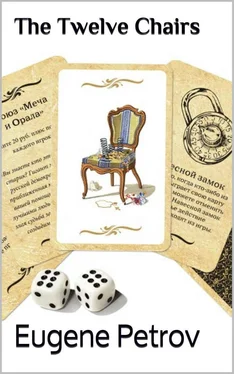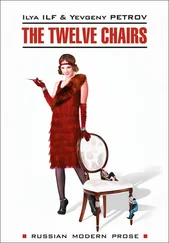Eugene Petrov - The Twelve Chairs
Здесь есть возможность читать онлайн «Eugene Petrov - The Twelve Chairs» весь текст электронной книги совершенно бесплатно (целиком полную версию без сокращений). В некоторых случаях можно слушать аудио, скачать через торрент в формате fb2 и присутствует краткое содержание. Год выпуска: 2013, Жанр: Юмористическая проза, на английском языке. Описание произведения, (предисловие) а так же отзывы посетителей доступны на портале библиотеки ЛибКат.
- Название:The Twelve Chairs
- Автор:
- Жанр:
- Год:2013
- ISBN:нет данных
- Рейтинг книги:5 / 5. Голосов: 1
-
Избранное:Добавить в избранное
- Отзывы:
-
Ваша оценка:
- 100
- 1
- 2
- 3
- 4
- 5
The Twelve Chairs: краткое содержание, описание и аннотация
Предлагаем к чтению аннотацию, описание, краткое содержание или предисловие (зависит от того, что написал сам автор книги «The Twelve Chairs»). Если вы не нашли необходимую информацию о книге — напишите в комментариях, мы постараемся отыскать её.
Find traces of a separate headset difficult and heroes face different adventures and troubles.
The Twelve Chairs — читать онлайн бесплатно полную книгу (весь текст) целиком
Ниже представлен текст книги, разбитый по страницам. Система сохранения места последней прочитанной страницы, позволяет с удобством читать онлайн бесплатно книгу «The Twelve Chairs», без необходимости каждый раз заново искать на чём Вы остановились. Поставьте закладку, и сможете в любой момент перейти на страницу, на которой закончили чтение.
Интервал:
Закладка:
some time, apparently reminiscing about the previous owner of the house.
"The police chief used to salute him. . . . I'd go and wish him a happy
new year, let's say, and he'd give me three roubles. At Easter, let's say,
he'd give me another three roubles. . . . Then on his birthday, let's say.
In a year I'd get as much as fifteen roubles from wishing him. He even
promised to give me a medal. 'I want my caretaker to have a medal,' he used
to say. That's what he would say: 'Tikhon, consider that you already have
the medal.'"
"And did he give you one? "
"Wait a moment. . . . T don't want a caretaker without a medal,' he
used to say. He went to St. Petersburg to get me a medal. Well, the first
time it didn't work out. The officials didn't want to give me one. 'The
Tsar,' he used to say, 'has gone abroad. It isn't possible just now.' So the
master told me to wait. 'Just wait a bit, Tikhon,' he used to say, 'you'll
get your medal.' "
"And what happened to this master of yours? Did they bump him off?"
"No one bumped him off. He went away. What was the good of him staying
here with the soldiers? . . . Do they give medals to caretakers nowadays?"
"Certainly. I can arrange one for you."
The caretaker looked at Bender with veneration.
"I can't be without one. It's that kind of work."
"Where did your master go?"
"Heaven knows. People say he went to Paris."
"Ah, white acacia-the emigre's flower! So he's an emigre!"
"Emigre yourself. . . . He went to Paris, so people say. And the house
was taken over for old women. You greet them every day, but they don't even
give you a ten-kopek bit! Yes, he was some master!"
At that moment the rusty bell above the door began to ring.
The caretaker ambled over to the door, opened it, and stepped back in
complete amazement.
On the top step stood Ippolit Matveyevich Vorobyaninov with a black
moustache and black hair. His eyes behind his pince-nez had a
pre-revolutionary twinkle.
"Master!" bellowed Tikhon with delight. "Back from Paris!"
Ippolit Matveyevich became embarrassed by the presence of the stranger,
whose bare purple feet he had just spotted protruding from behind the table,
and was about to leave again when Ostap Bender briskly jumped up and made a
low bow.
"This isn't Paris, but you're welcome to our abode."
Ippolit Matveyevich felt himself forced to say something.
"Hello, Tikhon. I certainly haven't come from Paris. Where did you get
that strange idea from?"
But Ostap Bender, whose long and noble nose had caught the scent of
roast meat, did not give the caretaker time to utter a word.
"Splendid," he said, narrowing his eyes. "You haven't come from Paris.
You've no doubt come from Kologriv to visit your deceased grandmother."
As he spoke, he tenderly embraced the caretaker and pushed him outside
the door before the old man had time to realize what was happening. When he
finally gathered his wits, all he knew was that his master had come back
from Paris, that he himself had been pushed out of his own room, and that he
was clutching a rouble note in his left hand.
Carefully locking the door, Bender turned to Vorobyaninov, who was
still standing in the middle of the room, and said:
"Take it easy, everything's all right! My name's Bender. You may have
heard of me!"
"No, I haven't," said Ippolit Matveyevich nervously.
"No, how could the name of Ostap Bender be known in Paris? Is it warm
there just now? It's a nice city. I have a married cousin there. She
recently sent me a silk handkerchief by registered post."
"What rubbish is this?" exclaimed Ippolit Matveyevich. "What
handkerchief? I haven't come from Paris at all. I've come from . . ."
"Marvellous! You've come from Morshansk!"
Ippolit Matveyevich had never had dealings with so spirited a young man
as Ostap Bender and began to feel peculiar.
"Well, I'm going now," he said.
"Where are you going? You don't need to hurry anywhere. The secret
police will come for you, anyway." Ippolit Matveyevich was speechless. He
undid his coat with its threadbare velvet collar and sat down on the bench,
glaring at Bender.
"I don't know what you mean," he said in a low voice.
"That's no harm. You soon will. Just one moment."
Ostap put on his orange-coloured boots and walked up and down the room.
"Which frontier did you cross? Was it the Polish, Finnish, or Rumanian
frontier? An expensive pleasure, I imagine. A friend of mine recently
crossed the frontier. He lives in Slavuta, on our side, and his wife's
parents live on the other. He had a row with his wife over a family matter;
she comes from a temperamental family. She spat in his face and ran across
the frontier to her parents. The fellow sat around for a few days but found
things weren't going well. There was no dinner and the room was dirty, so he
decided to make it up with her. He waited till night and then crossed over
to his mother-in-law. But the frontier guards nabbed him, trumped up a
charge, and gave him six months. Later on he was expelled from the trade
union. The wife, they say, has now gone back, the fool, and her husband is
in prison. She is able to take him things. . . . Did you come that way,
too?"
"Honestly," protested Ippolit Matveyevich, suddenly feeling himself in
the power of the talkative young man who had come between him and the
jewels. "Honestly, I'm a citizen of the RSFSR. I can show you my
identification papers, if you want."
"With printing being as well developed as it is in the West, the
forgery of Soviet identification papers is nothing. A friend of mine even
went as far as forging American dollars. And you know how difficult that is.
The paper has those different-coloured little lines on it. It requires great
technique. He managed to get rid of them on the Moscow black market, but it
turned out later that his grandfather, a notorious currency-dealer, had
bought them all in Kiev and gone absolutely broke. The dollars were
counterfeit, after all. So your papers may not help you very much either."
Despite his annoyance at having to sit in a smelly caretaker's room and
listen to an insolent young man burbling about the shady dealings of his
friends, instead of actively searching for the jewels, Ippolit Matveyevich
could not bring himself to leave. He felt great trepidation at the thought
that the young stranger might spread it round the town that the ex-marshal
had come back. That would be the end of everything, and he might be put in
jail as well.
'Don't tell anyone you saw me," said Ippolit Matveyevich. "They might
really think I'm an emigre." "That's more like it! First we have an Emigre
who has returned to his home town, and then we find he is afraid the secret
police will catch him."
"But I've told you a hundred times, I'm not an emigre."
"Then who are you? Why are you here?"
"I've come from N. on certain business."
"What business?"
"Personal business."
"And then you say you're not an emigre! A friend of mine . . ."
At this point, Ippolit Matveyevich, driven to despair by the stories of
Bender's friends, and seeing that he was not getting anywhere, gave in.
"All right," he said. "I'll tell you everything."
Anyway, it might be difficult without an accomplice, he thought to
himself, and this fellow seems to be a really shady character. He might be
useful.
CHAPTER SIX
A DIAMOND HAZE
Ippolit Matveyevich took off his stained beaver hat, combed his
Читать дальшеИнтервал:
Закладка:
Похожие книги на «The Twelve Chairs»
Представляем Вашему вниманию похожие книги на «The Twelve Chairs» списком для выбора. Мы отобрали схожую по названию и смыслу литературу в надежде предоставить читателям больше вариантов отыскать новые, интересные, ещё непрочитанные произведения.
Обсуждение, отзывы о книге «The Twelve Chairs» и просто собственные мнения читателей. Оставьте ваши комментарии, напишите, что Вы думаете о произведении, его смысле или главных героях. Укажите что конкретно понравилось, а что нет, и почему Вы так считаете.












